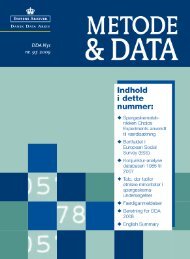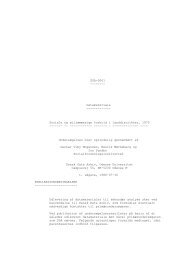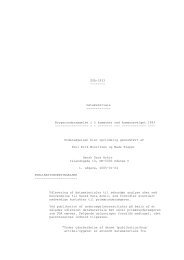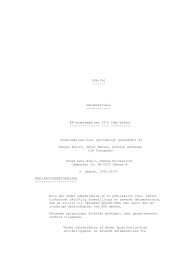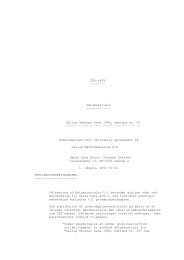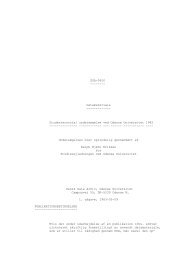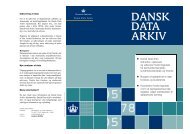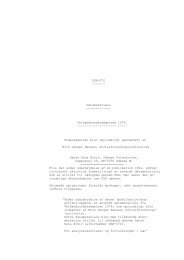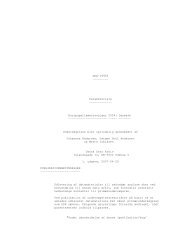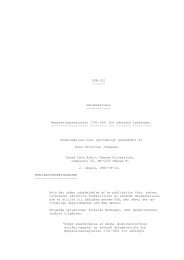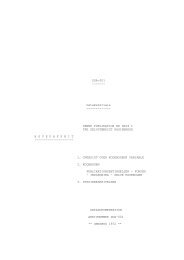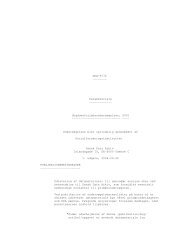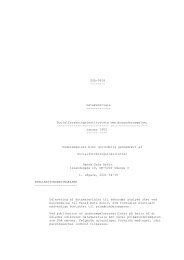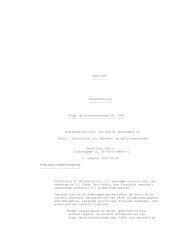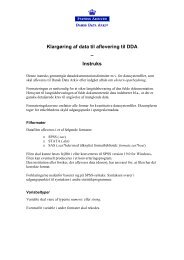Metode og Data nr. 86 - DDA Samfund - Dansk Data Arkiv
Metode og Data nr. 86 - DDA Samfund - Dansk Data Arkiv
Metode og Data nr. 86 - DDA Samfund - Dansk Data Arkiv
Create successful ePaper yourself
Turn your PDF publications into a flip-book with our unique Google optimized e-Paper software.
English Summary<br />
By ULLA ANDERSEN, <strong>DDA</strong><br />
The main theme of this issue of <strong>Metode</strong> &<br />
<strong>Data</strong> is medical research/medical research<br />
data. By choosing this theme we hope to<br />
contribute to drawing attention to the necessity<br />
of establishing a professional data archive<br />
for the medical research sector in the future at<br />
a time when ERAS – Enheden for registrering<br />
<strong>og</strong> arkivering af sundhedsvidenskabelige data<br />
(The unit of registration and storage of<br />
medical research data) is at the expiration of<br />
its project period.<br />
The first article contains a presentation of<br />
ERAS and the future of the archiving of<br />
medical research data in Denmark. The article<br />
is addressed to readers who already know<br />
ERAS as well as to new readers.<br />
It is a well-known fact that the methods and<br />
techniques used within social science and<br />
medical research are very much the same as<br />
regards collection and analysis of data on<br />
individuals (micro data). The two articles<br />
„Registrenes sundhedsvidenskabelige potentiale“<br />
(The Medical Research Potential of<br />
the Registers) and „<strong>Data</strong> <strong>og</strong> metadata af høj<br />
kvalitet“ (<strong>Data</strong> and Metadata of High Quality)<br />
by Thorkild I.A. Sørensen and Jens M.<br />
Lauritsen, respectively, are both written by<br />
researchers within medical research; however,<br />
the articles are relevant for everyone who<br />
takes an interest in collection and/or analysis<br />
of empirical research data.<br />
Thorkild I.A. Sørensen’s article presents<br />
the possibilities for medical research which<br />
are contained in the many – comprehensive –<br />
side 51 <strong>Metode</strong> & <strong>Data</strong> <strong>nr</strong>. <strong>86</strong> – 2002<br />
registers with information on the total Danish<br />
population as well as in the questionnaire<br />
surveys which contain detailed information<br />
about a statistically selected sample of the<br />
population. In addition, Mr. Sørensen puts<br />
forward a number of ethical considerations<br />
and discusses the risks of abuse of information<br />
by researchers who are granted access to the<br />
data.<br />
Research based on registers is often<br />
specifically associated with medical research,<br />
but the registers are, of course, also of interest<br />
for the social sciences, just as some of the<br />
social science research data in the <strong>DDA</strong>’s<br />
holdings also can be used in medical research<br />
projects.<br />
The article by Jens M. Lauritsen introduces<br />
the pr<strong>og</strong>ram Epi<strong>Data</strong>, which has been<br />
designed for the collection of data for<br />
research. The article describes the challenges<br />
researchers meet when creating data and<br />
documentation of high quality, in general<br />
and in particular within medical research.<br />
The last article in this issue is a slightly<br />
revised version of a report from the committee<br />
concerning the storage of medical research<br />
data. The report contains suggestions to the<br />
organization of a future permanent unit of<br />
registration and archival storage of medical<br />
research data.<br />
Finally, the usual section Studies processed<br />
to class D this time contains medical research<br />
studies which will be available to researchers<br />
and students – now and in the future.



